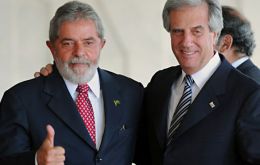MercoPress. South Atlantic News Agency
Stories for 2009
-
Friday, May 8th 2009 - 04:16 UTC
Bank of England to pump additional £ 50 billion to the economy

The Bank of England has held interest rates unchanged at their record low of 0.5% but stepped up its program to boost the economy with injections of new money. It is the second month in a row that rate-setters have held the cost of borrowing as attention turns to the results of its scheme of quantitative easing (QE) - effectively printing money - to ease credit conditions in the ailing economy.
-
Friday, May 8th 2009 - 04:13 UTC
ECB follows US, UK, Japan and announces quantitative easing

The European Central Bank is to embark on its own quantitative easing program in response to the sharpest economic slowdown in Europe since the Second World War, it was announced Thursday. The news follows similar measures in the UK, US and Japan over the past few months.
-
Friday, May 8th 2009 - 03:13 UTC
Ghost nets and lost fishing gear hurting marine environment

Large amounts of fishing gear lost at sea or abandoned by fishers are hurting the marine environment, impacting fish stocks through “ghost fishing” and posing a hazard to ships, according to a new report jointly produced by the UN Food and Agriculture Organization (FAO) and UN Environment Programme (UNEP).
-
Thursday, May 7th 2009 - 13:49 UTC
Ministers meet to advance creation of South American development bank

Economy and Finance ministers from seven South American countries are scheduled to meet Friday in Buenos Aires to advance in the creation of the Bank of the South, a financial institution to fund infrastructure and development projects in the region.
-
Thursday, May 7th 2009 - 13:44 UTC
Sao Paulo, Santiago best cities for business in Latinamerica

Business journal América Economía last week ranked Santiago as the second best city in Latin America for business, just behind Sao Paulo and ahead of Miami, Mexico City, and Buenos Aires.
-
Thursday, May 7th 2009 - 13:38 UTC
Canadian scientists complete genetic sequence of H1N1

A team of Canadian scientists have completed the genetic sequencing of three H1N1 viruses taken from Mexico, Nova Scotia and Ontario, the first complete sequencing of the human swine flu, it was announced Wednesday.
-
Thursday, May 7th 2009 - 13:28 UTC
Argentina April car production and sales down 32% and 29%

Argentina produced 37,262 cars in April which is 1.7% less than the previous month and down 31.8% from a year ago, the automotive manufacturers association, Adefa, reported Wednesday. April exports dropped 23.8% compared to April 2008, totaling 23,249 cars, but increased 12.6% from March. Brazil was by far the leading export market, taking about 84% of exports.
-
Thursday, May 7th 2009 - 11:40 UTC
Businesses in Mexico City reopen; masks for workers and customers

Many businesses in Mexico have re-opened after a five-day shutdown caused by the A/H1N1 influenza outbreak that killed 44 people, including two in the US. From Thursday, all businesses in Mexico City can re-open, so long as they follow hygiene guidelines, including masks for all workers and customers.
-
Thursday, May 7th 2009 - 08:48 UTC
Paraguay and Bolivian Indians plight in the limelight

The director of the British-based organization Survival this week urged the Paraguayan government not to authorize a Brazilian livestock company to operate on lands of the Ayoreo-Totobiegosode Indians while in Bolivia a UN mission discovered Indian communities subjected to forced labour.
-
Thursday, May 7th 2009 - 08:41 UTC
Uruguay/Brazil will operate in local currencies to ensure bilateral trade

Uruguay and Brazil expect to have bilateral trade operations in their respective local currencies in place in a few months time, according to the Uruguayan Central Bank. The system is similar to that implemented between Brazil and Argentina and which is beginning to be operational.
